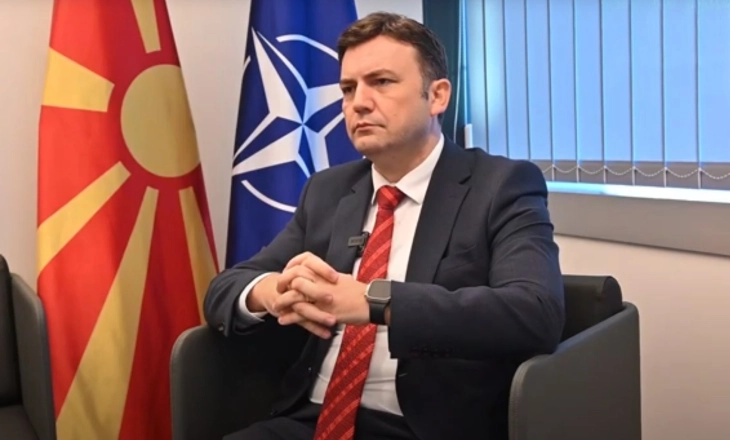Osmani: Commitment to Euro-integrations to boost resilience to potential Russian influences
- The threat from Russia is serious and we aren’t saying this only as part of our political narratives, but the structures responsible for the assessment of the risk of Russian aggression and the effects caused by Russia’s ambitions are saying this as well, Foreign Minister Bujar Osmani told MIA on Wednesday after the first day of NATO’s ministerial meeting in Brussels.
- Post By Angel Dimoski
- 18:37, 3 April, 2024

Brussels, 3 April 2024 (MIA) – The threat from Russia is serious and we aren’t saying this only as part of our political narratives, but the structures responsible for the assessment of the risk of Russian aggression and the effects caused by Russia’s ambitions are saying this as well, Foreign Minister Bujar Osmani told MIA on Wednesday after the first day of NATO’s ministerial meeting in Brussels.
According to Osmani, with a potential victory in Ukraine, Russia would establish a direct corridor to Transnistria and Moldova, making Transnistria its “second stop” alongside Georgia, which would then be followed by the Western Balkans.
“The Western Balkans is already a serious target for Russia’s hybrid threats. Russia has established its proxy centers, proxy politicians, proxy political parties in the Western Balkans, including in North Macedonia, so I can confirm that the Western Balkans is on the list of Russia’s imperial ambitions,” Osmani said, adding that the country must continue supporting Ukraine and maintain strategic predictability in response.
According to the FM, the statements of opposition politicians regarding a potential renegotiation of the EU Negotiating Framework and a withdrawal from the Treaty of Good-Neighborliness with Bulgaria are a cause for “serious concern”.
“Firstly, they’re manipulating the public with the potential of renegotiating the Negotiating Framework. This is impossible. The European Union doesn’t work like that. Decisions are made by consensus of 27 member states, and there is no chance to renegotiate if a single country opposes it. Secondly, if the country’s European process is blocked, not only does it become vulnerable in terms of possible Russian influence, but all processes in the country that are stabilized and harmonized on the basis of the European idea will begin to implode,” Osmani stated.
According to Osmani, such an approach would affect the country’s economic progress, reforms, inter-ethnic and good-neighborly relations and the EU’s positive influence in terms of boosting the country’s resilience. “The country will become vulnerable and this will be the greatest gift for Vladimir Putin and his imperial ambitions,” he said.
Touching upon the NATO ministerial meeting, Osmani said the main topics were the defining of priorities and conclusions for July’s NATO Summit in Washington, as well as the strengthening of the Alliance’s unity in terms of its support for Ukraine.
“Of course I had the chance to state that North Macedonia has achieved the target of spending 2 percent of GDP on defense, even exceeding it with 2.05 percent in the 2024 Budget, with the commitment of reaching 2.15 percent in 2025,” Osmani said.
The Foreign Minister said at the meeting North Macedonia supported the proposals for increased coordination of various initiatives in support for Ukraine with the goal of increasing the efficiency of that assistance.
Photo: MIA







